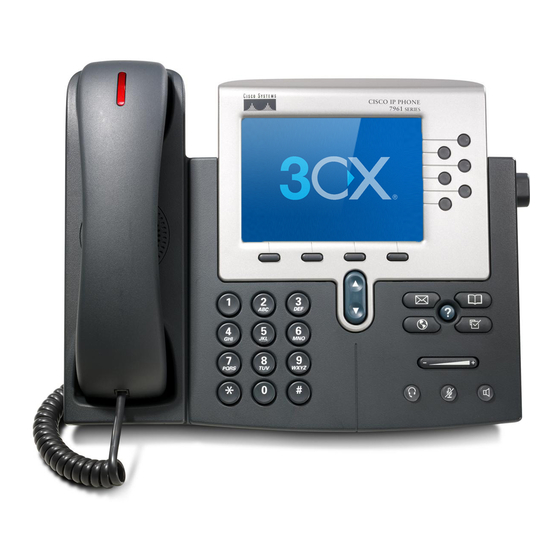© 2011 Cisco and/or its affiliates. All rights reserved. This document is Cisco Public Information.
Figure 2.
Close-Up of Display and Lighted Line Keys
Features and Benefits
The Cisco Unified IP Phone 7962G is designed to grow with your organization and enhancements
to your system capabilities. The dynamic feature set allows the phone to keep pace with your
requirements through regular software updates. Firmware changes can be downloaded from
Cisco.com. No hands-on moves and changes are required with the phone—you can simply pick up
the phone and move to a new location anywhere on your network. The Cisco Unified IP Phone
7962G also provides many accessibility features. Table 1 lists the phone's features.
Table 1.
Cisco Unified IP Phone 7962G Features
Feature
Description/Benefit
Display
5-inch (12.5 cm), high-resolution (320 x 222), graphical monochrome 4-bit grayscale display.
Allows for greater flexibility of features and applications, and significantly expands the
information viewed when using features such as Services, Information, Messages, and
Directory. Display also supports localization requiring double-byte Unicode encoding for
fonts.
Wideband Audio
Support for wideband (G.722 codec, adherence to TIA 920), including handset, headset,
and speakerphone (see Q&A for details).
Codec Support
G.711a, G.711µ, G.729a, G.729ab, G.722, and iLBC audio compression codecs are
supported (see Q&A for details).
Speakerphone
Full-duplex speakerphone with acoustic echo cancellation.
Messages Key
Provide direct access to voicemail.
Directories Key
Ready access to missed, received or placed calls (plus intercom history and directories).
Incoming messages are identified and categorized on the display, allowing users to quickly
and effectively return calls using direct dial-back capability. Corporate directory integrates
with the Lightweight Directory Access Protocol Version 3 (LDAP3) standard directory.
Settings Key
Allows user to adjust display contrast, select background images (if available), and select
ringer sounds through the User Preference menu. Network Configuration preferences also
can be set up (usually by the system administrator). Configuration can be set up either
automatically or manually for Dynamic Host Control Protocol (DHCP), Trivial File Transfer
Protocol (TFTP), Cisco Unified Communications Manager, and backup Cisco Unified
Communications Manager instances. Other available Settings submenus include Device
Configuration, Security Configuration, and Model Information.
Services Key
Allows users to quickly access diverse information such as weather, stocks, quote of the
day, or any Web-based information using XML.
Help Button
Online Help gives users information about the phone keys, buttons, and features.
Speakerphone, Mute,
Speakerphone includes Speaker On/Off, Microphone Mute, and Headset buttons that are lit
and Headset Buttons
when active. For added security, the audible dual tone multifrequency (DTMF) tones are
masked when the speakerphone mode is used.
Data Sheet
Page 2 of 5

